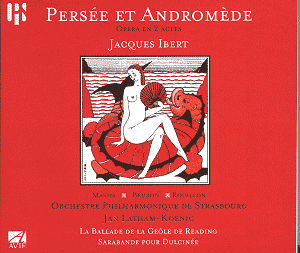|
And so the process continues ... dusty cupboards are
ransacked for novelties. Warehouses we did not even know existed are laid
bare and orchestras and chamber groups get to grips with works last performed
decades ago or never performed. Avie, after a start which made me wonder
whether they were only interested in the more accustomed ‘tracks’, now
strike out in new directions. They do this extremely successfully in the
case of this Ibert album and also in their provocative 'Trails of Creativity'
set.
Ibert is by no means the purveyor of light triviality
we may have expected from his less neglected orchestral works.
The plot of Persée involves Andromeda imprisoned
on an island by the Olympian Gods with the gaoler, the monster Cathos.
Andromeda is a great beauty and her Gaoler falls in love with her. Perseus
appears from the skies borne by the winged horse Pegasus. Perseus kills
Cathos leaving Andromeda distraught. She shuns the vain and shallow Perseus
who leaves. Finally all is well, for a handsome prince - the loving essence
of Cathos - emerges from the slaughtered corpse. All ends in a love duet.
The music is like a meeting between Ravel's Daphnis et Chloe (in
the first and last five minutes) without the density of equatorial foliage
and with the lighter-handed orchestral works of Poulenc. Massis sounds
believably young. The lovelorn Cathos (Rouillon) is peat-toned and stentorian.
Both sound well in the exotically and languidly-blooming love duet which
rounds out this episode from halcyon antiquity. This is a forty minute
opera - half an evening in the theatre. It might pair rather well with
Holst's The Perfect Fool, Havergal Brian's savagely Straussian
Agamemnon, Szymanowski's Hagith, Vaughan Williams' Synge
opera Riders to the Sea or Barber's touchingly intimate A Hand
of Bridge. All would offer contrast rather than kinship.
After the opera comes a storm of passions and injustice
in La Ballade de la Géole de Reading. It was written in
the Villa Medici in 1920, a couple of years before his brilliant suite
Escales of which Munch and Stokowski made superb recordings. This
is a most touching piece in three ‘panels’ originally intended for a symphony.
The music rises to passion summed up in the 'wistful eye' with which the
prisoner gazes upwards towards freedom and 'that little tent of blue which
prisoners call the sky'. The music touches on the Daphnis style
in Persée but is less impressionistic and more tartly melodic.
There are no jagged edges in this music but still it subtly probes the
pain and guilt both of the prisoner and of the world bent on retribution
but tormented by promptings of mercy. The music has the most flourishing
driven romantic passion - listen to 10.11 in tr. 14 - the first movement
of three in what amounts to a glowingly filmic tone poem from which you
will not be able to extract a single tawdry moment. I wonder if Miklós
Rózsa, or for that matter Messiaen, knew this piece. It would not
surprise me. Listen to Ben Hur or the Turangalila Symphony with
a new perspective next time you hear them. Wilde's poem, as adapted and
rearranged by Ibert, is printed in the booklet.
Next we come to a graceful character-picture of Don Quixote's
Dulcinea in which Ibert imbues the music with the glowing passion of the
unrequited. This is a lovingly rounded Sarabande which would pair
nicely with Ravel's Pavane. I hope that Avie will record the complete
ballet in due course. Peaceful music avoiding the slough of blandness.
While I have had the odd criticism of Avie CDs in the
past (their Errolyn Wallen booklet had several pages printed with indistinct
contrast between ground and letters) this production is nothing short
of exemplary. The disc case and the separate booklet are there in a stylish
card slipcase. The libretto and translations are complete. The notes are
helpful and well written. The print size is sensible.
Can we also hope now for Avie to record the other Ibert
operas: Angelique (1926), Le Roi d'Yvetot (1928), Gonzague
(1931), L'Aiglon (1937) and the operetta Les Petites Cardinales
(1938)? Alternatively let me invoke a few other Gallic projects. We
need a complete anthology of the orchestral works of the French composer
Witkowski. How about the grand opera Le Mas by Canteloube? Better
yet, given the Strasbourg connection, let me implore Simon Foster to record
the Fourth and Fifth symphonies of Guy-Ropartz; both sea-spattered, passionate
canvases that deserve to live beyond their half-life on battered ancient
broadcast tapes.
Ibert does not get much recorded attention on the world
stage. This recording and the Naxos disc made a couple of years ago by
Takuo Yuasa begin to redress the imbalance. That this Avie record evinces
such style and care for detail, and just as crucial, for passion, is to
the credit of all involved in this excellent production.
Rob Barnett
see also review
by Colin Clarke
|
CD Price:
£ 12.49 Post-free Air Mail World-wide
- Download Price:
£ 9.47
Buy
CD:
Download all tracks:
--------------------------------------------------------------------------------
FREE SOUND SAMPLES
(minimum 30 secs)
Introduction
Voici
l'aube
Cathos,
ecoute moi...
Andromede
rassuree se rendort
Ah!
Il
etait une fois fois
Que
le diable t'emporte
Ah!
Cette toison rausse...
Oh!
La-bas dans le ciel
Je
t'attendais
Adieu,
noble Andromede...
Pauvre,
pauvre, o pauvre monstre
Andromede!
Merci!
La Ballade
de la Geole de Reading
Il
n'avait plus tunique ecarlate
Cette
nuit la...
Le
vent frais du matin commenca a gemir
Sarabande
pour Dulcinee
You require QuickTime to listed to samples.
Get a free
QuickTime download here
|

![]() for
details
for
details